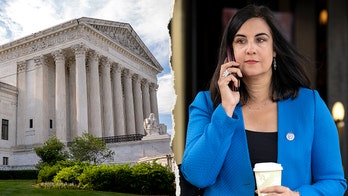Fox News Flash top headlines for October 15
Fox News Flash top headlines are here. Check out what's clicking on Foxnews.com.
The state of Utah is set to vote on seven proposed Constitutional ballot amendments in November, on issues including how education is funded and modernizing language around gender.
Here is a breakdown of each one by the Utah Foundation, a non-profit organization, as part of its "On the Ballot" analysis project.
Four of the following seven amendments were the result of resolutions supported unanimously on the state house and senate floors, the Foundation's webpage reads.
"One was unanimous when it was heard in the Senate, but when it went to the House it faced nearly enough opposition to kill the resolution," the message continued. "The final two amendments faced more opposition."
AMENDMENT A: CHANGE LANGUAGE THAT APPLIES TO A SINGLE GENDER
This amendment would change the language that applies to a single gender, meaning it would replace “men” with “persons” in the state Constitution and make other similar changes to reflect the measure if passed.
The Utah Constitution still refers to legislators with male pronouns, but this reversal wouldn't be the only change. It would also alter several other terms. Husband or wife would be replaced with a spouse; he replaced with [legislative] member, and; men replaced with persons.
AMENDMENT B: LEGISLATOR AGE REQUIREMENT
Amendment B would clarify the language in the state Constitution about the eligibility qualifications required to be elected, or appointed, to the state House and state Senate.
The requirements -- that the candidate must be a citizen of the United States, at least 25 years old and a voter in the relevant district -- would remain the same.
Instead, the measure would specify that the requirements must be met at the time of election or appointment.
AMENDMENT C: REMOVE SLAVERY AS PUNISHMENT FOR A CRIME
This amendment would repeal a provision in the Utah Constitution allowing for slavery and involuntary servitude as a form of criminal punishment.
Twelve states (including Utah) contain provisions in their constitutions allowing slavery and involuntary servitude as a punishment, according to the Foundation.
There is reportedly no formal opposition to this amendment.
AMENDMENT D: MUNICIPAL WATER RESOURCES
This proposed amendment would allow cities to supply water to neighboring communities, individual consumers, and others outside of city limits.
Article XI, Section 6 of the state Constitution does not explicitly allow cities to sell water outside of their boundaries.
Some municipal water utilities, however, have still supplied areas outside their jurisdiction for years.
HOW SUNBELT STATES COULD BE EARYL INDICATORS OF ELECTION WINNERS
AMENDMENT E: RIGHT TO HUNT AND FISH
Amendment E would guarantee the right to hunt and fish in the state Constitution.
Utah regulations would still apply, but the move would require hunting and fishing to be the “preferred means of managing and controlling wildlife."
Twenty-two states have adopted the right to hunt and fish.
"This Constitutional amendment would likely result in little change from the status quo," the website read. "Hunting and fishing will still be regulated by the state and the amendment will not infringe on property law or state sovereignty. Hunting and fishing is currently the method the Utah Department of Wildlife Resources uses, to control wildlife populations in an effort to preserve habitat."
AMENDMENT F: LEGISLATIVE SESSION START DATE
This amendment would allow the state legislature to set the legislative session start date by statute and would remove the constitutional requirement that they begin on the fourth Monday in January. The amendment would make no changes to the length of legislative sessions.
"Ultimately, this appears to be an amendment that addresses the preferences of state legislators and a desire for greater flexibility," the Foundation wrote.
AMENDMENT G: EXPANDED USE OF INCOME TAX REVENUE
The final amendment up for consideration would allow Utah to expand the use of state income tax revenue from its current limitations, so it may be used for support services and programs for children and people with disabilities -- instead of just for public education.
"Since the 1940s, income taxes have been dedicated toward education," the Foundation wrote. "The 2020 amendment would add language to Article XIII, Section 5, of the Utah Constitution so that income tax revenue could also be used for other child-related programs and people with disabilities."
CLICK HERE FOR THE FOX NEWS APP
"The fiscal impact of the amendment is unclear," the post went on to say. "The definition of programs that 'support children and … support individuals with a disability' is not well defined and is subject to interpretation. The Lieutenant Governor’s Office estimates that up to $600 million is currently spent on such categories. Still, the vagueness of the categories makes it difficult to understand how much money might not go to schools because it can be redirected to services previously covered by the General Fund."














































